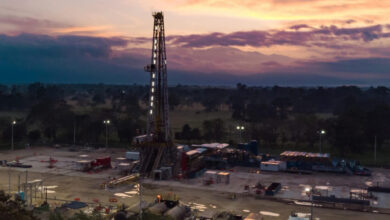Talent growth
IADC teams with US colleges to kick off Workforce Attraction and Development Initiative
By Amy Rose, IADC director of external relations
The drilling industry needs more competent workers – it needs a lot more of them and needs them urgently. Rig demand is strong in almost every drilling market, and dozens of newbuilds are scheduled to be commissioned over the next several years. Attracting new people and preparing them with the necessary training and credentials to succeed has become one of the industry’s most critical concerns. Recognizing this need, IADC has launched the Workforce Attraction and Development Initiative (WADI). When fully operational next year, the project will unite industry and educational entities to work in tandem to attract and train the next generation.

“Speaking for US land, there are currently roughly 40,000 people employed on the rigs for drilling contractors,” said 2013 IADC vice chairman Jay Minmier, president of Nomac Drilling. “Historical attrition rates have been 30% to 40% so we are talking about 10,000 to 12,000 new-hires per year just to sustain, not including growth. It’s safe to say that we are looking at needing 20,000 to 25,000 people to come into the industry in the next two years. And if you include the worldwide offshore market, it may be double that amount.”
“WADI addresses the industry’s increasing need for pre-screened, pre-trained and pre-qualified entry-level, new-hire candidates. It will connect the oil and gas industry with community colleges that have a track record of successfully developing coursework and programs to prepare would-be personnel for their industry of choice,” said Mark Denkowski, vice president of IADC’s Accreditation and Credentialing Division. “Additionally, WADI will offer personal development trajectories and career guidance for both new-hires and existing rig-based personnel.”
At a kick-off meeting on 13 August in Houston, IADC brought together representatives from industry and community colleges around the US – including Texas, Wyoming, North Dakota, Ohio, Pennsylvania, Colorado, Mississippi and Utah – to brainstorm ways in which they can work together to train the next generation of rig employees.

In his opening remarks, IADC president and CEO Stephen Colville explained why IADC is uniquely qualified to step in and provide the solutions that industry seeks. “We are about ensuring that every person on every rig is competent – that they know what to do; that they are capable – they know how to do it – and that they are compliant – they do it. Attracting people to our industry and ensuring they have the credentials and competence to get their jobs done safely is a key issue that is critical to our industry’s success. With the formation of WADI, IADC is providing the solution.”
Participants at the meeting discussed the upward trend of non-traditional applicants interested in pursuing a career in the oil and gas industry. Returning veterans and those previously employed in the construction industry were highlighted as sectors of talent fueling this trend.
“We have a huge demand for competent people in our industry. IADC can broker a bridge between content providers and the ultimate consumer, the drilling contractors. Today we have to do our own recruiting, screening and training in-house. It’s effective but not one of our core competencies. It’s inarguable that community colleges and training providers can do that more effectively and more cost effectively,” Mr Minmier said.
Community college representatives also participated in a discussion on how to develop a standardized curriculum and guidelines.

“What we do know is that oil and gas is like any other heavy industry. It’s work where folks can get hurt if they aren’t trained. Teaching KSAs, as colleges and as training providers and as educators, we can make sure that our curriculum addresses those issues and that we are hiring the most capable folks for training our staff and faculty. It’s also important that we are scaffolding knowledge – it’s one thing to provide initial training, but it’s something else to build knowledge over time as workers take on more and more challenges and technology changes,” said Joan Smith, dean and executive director for Red Rocks Community College.
“This initiative is really about working together and having industry teaching alongside us. It’s an ongoing partnership where we are engaged fully, both of us together, industry and education, so that we can truly make this industry a safe place for people to work, earn a living for their families and have career and advancement opportunities,” Ms Smith continued.
Echoing her thoughts, Cecil Brewer, a consultant on workforce education, said, “Community colleges have a long history of working with that forum of vocational education, training people in electronics, pneumatics, mechanical systems, which are very closely related to what is done on a drilling rig or drillship. The goal of drillers is to make a hole in the ground as quickly, as safely and as efficiently as they possibly can with a competent crew. Community colleges can absolutely help with that.”
Tim Stogner, industrial services coordinator for Southwest Mississippi Community College, reflected on the eventual outcomes of WADI for the industry. “Initially WADI will focus on providing a consistent structure for entry-level training for people entering the workforce. Once they are able to do that, they will receive good compensation to provide for their families. And as they progress, they will look at opportunities to advance in the company. They will receive a lot of training to be leaders in an organization, which leads to a win/win for everyone.”
Discussion at the kick-off event also touched on how all participants can work together and what WADI might look like moving forward.
“I’m very encouraged by the outcome of this initial WADI meeting – the room was electric and filled with people who are excited about the opportunity to collaboratively develop training and development courses,” Mr Denkowski said. IADC will coordinate all communication between the colleges and provide subject matter experts via IADC committees through the process. The group will soon begin work on new candidate training guidelines and plans to meet again in November to evaluate progress and drive on the next steps.





This WADI initiative clearly demonstrate the strong commitment by IADC in confronting this very important talent development issue faced by the industry today. Bringing together the industry and educational institutions is a proactive approach to address this challenge. Coming from a University with strong focus towards the oil and gas industry I strongly feel this is the best way to highlight this urgent problem.
I am keenly interested in Drilling Engineering and related Training. I am qualified with a degree in Electrical / Electronics Engineering.
I can be contacted on my cell phone at:
713-876-3872
Email: Subedar486@gmail.com
Thank you
M. Subedar
I see a strong focus towards combating skill shortages in the drilling industry via IADC WADI initiatives. If the objectives are properly guided and executed accordingly with all the required players and partners, this approach will arrest skill shortages and create a better interface between the school and industry worldwide.
Hello,
I am Research engineer in oil and gas industry in Singapore with 3 years of experience. I am interested in undergoing any required training since I aspire to become a professional in drilling industry. I am a masters graduate in Mechanical engineering.
Thanks,
Karthi.